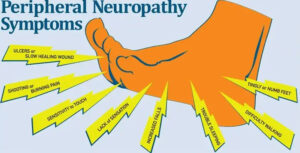 Understanding Peripheral Neuropathy
Understanding Peripheral Neuropathy
Peripheral neuropathy is a condition that affects the nerves outside of the brain and spinal cord, often causing weakness, numbness, and pain, usually in the hands and feet. This condition can result from various causes, including diabetes, infections, traumatic injuries, and exposure to toxins.
Causes of Peripheral Neuropathy
Peripheral neuropathy can result from a variety of factors, including diabetes, autoimmune diseases, infections, and exposure to toxins such as alcohol and certain medications. In some cases, the exact cause of peripheral neuropathy may be unknown, a condition referred to as idiopathic neuropathy.
Types of Peripheral Neuropathy
There are four main types of peripheral neuropathy:
Sensory neuropathy: This type affects the nerves responsible for sensation, leading to symptoms such as tingling, numbness, and pain.
Motor neuropathy: Motor neuropathy affects the nerves that control muscle movement, causing weakness, muscle cramps, and difficulty walking.
Autonomic neuropathy: Autonomic neuropathy affects the nerves that control involuntary bodily functions such as digestion, blood pressure, and heart rate. Symptoms may include dizziness, nausea, and digestive issues.
Mixed neuropathy: Mixed neuropathy involves a combination of sensory, motor, and autonomic nerve damage, leading to a range of symptoms.
Symptoms of Peripheral Neuropathy
Symptoms of peripheral neuropathy can vary depending on the type and severity of nerve damage but may include numbness, tingling, weakness, and pain, often starting in the hands and feet and spreading to other areas of the body.
Diagnosis and Treatment
Diagnosis of peripheral neuropathy typically involves a physical examination, nerve conduction tests, and possibly imaging tests such as MRI or CT scans. Treatment may include medications to manage pain and other symptoms, physical therapy, and lifestyle changes to help manage underlying conditions such as diabetes.
Prevention
While some causes of peripheral neuropathy may not be preventable, certain lifestyle changes such as maintaining a healthy weight, managing blood sugar levels, and avoiding exposure to toxins can help reduce the risk of developing this condition.
In conclusion, peripheral neuropathy can significantly impact quality of life, but with early diagnosis and appropriate treatment, many symptoms can be managed effectively. If you’re experiencing symptoms of peripheral neuropathy, don’t hesitate to contact Southwest Foot and Ankle Center. Our team of experienced podiatrists specializes in the treatment of chronic foot conditions and can provide the relief you need.
Contact us
Schedule an appointment
with our podiatrist by contacting us or calling our:
